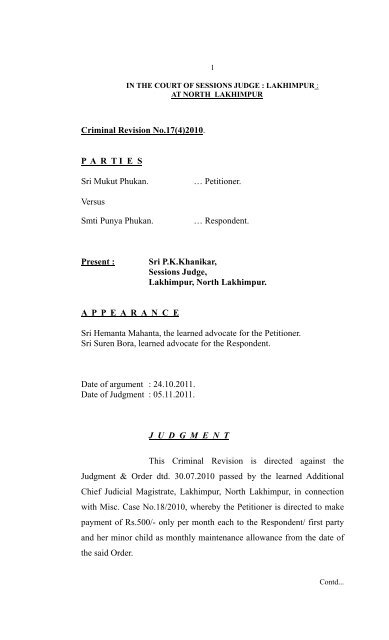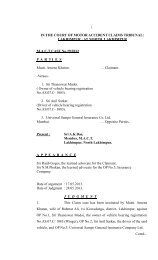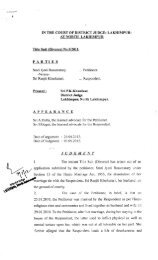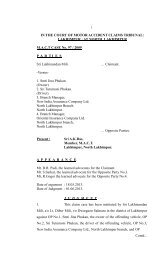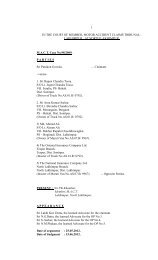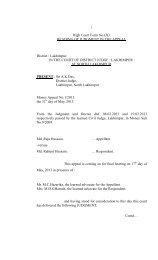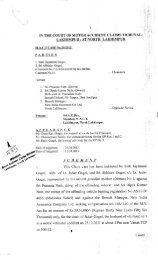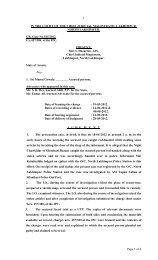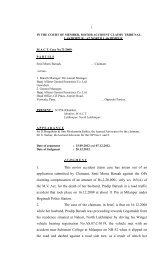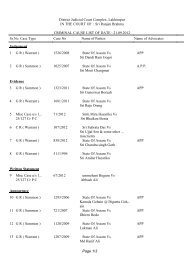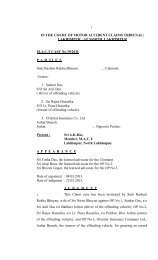Criminal Revision No.17(4) - Lakhimpur Judiciary
Criminal Revision No.17(4) - Lakhimpur Judiciary
Criminal Revision No.17(4) - Lakhimpur Judiciary
Create successful ePaper yourself
Turn your PDF publications into a flip-book with our unique Google optimized e-Paper software.
1IN THE COURT OF SESSIONS JUDGE : LAKHIMPUR :AT NORTH LAKHIMPUR<strong>Criminal</strong> <strong>Revision</strong> <strong>No.17</strong>(4)2010.P A R T I E SSri Mukut Phukan.… Petitioner.VersusSmti Punya Phukan.… Respondent.Present :Sri P.K.Khanikar,Sessions Judge,<strong>Lakhimpur</strong>, North <strong>Lakhimpur</strong>.A P P E A R A N C ESri Hemanta Mahanta, the learned advocate for the Petitioner.Sri Suren Bora, learned advocate for the Respondent.Date of argument : 24.10.2011.Date of Judgment : 05.11.2011.J U D G M E N TThis <strong>Criminal</strong> <strong>Revision</strong> is directed against theJudgment & Order dtd. 30.07.2010 passed by the learned AdditionalChief Judicial Magistrate, <strong>Lakhimpur</strong>, North <strong>Lakhimpur</strong>, in connectionwith Misc. Case No.18/2010, whereby the Petitioner is directed to makepayment of Rs.500/- only per month each to the Respondent/ first partyand her minor child as monthly maintenance allowance from the date ofthe said Order.Contd...
2The material facts leading to filing of this <strong>Criminal</strong><strong>Revision</strong> may be summarised as follows :The Respondent/ first party had initiated a proceedingu/s 125 CrPC against the Petitioner/ second party stating interalia that shewas married to the Petitioner/ second party about 6/7 years back as persocial customs, and thereafter they lived together as husband and wife,and out of their marital wedlock, two daughters were born. It is allegedthat after about one month of her marriage, the Petitioner/ second partyill-treated and perpetrated physical as well as mental torture upon her ondemand of dowry and used to drive her out from the matrimonial home,but her father used to take back her to her matrimonial home, and on eachsuch occasion the Petitioner/ second party did not mend his behaviourand conduct towards her and again about two years back, he drove herout from the matrimonial home while she was in pregnant condition, forwhich she was compelled to take shelter in her parental home, and on21.06.2009, she gave birth to another daughter. It is also alleged by theRespondent/ first party that the Petitioner/ second party neither enquiredabout her and her baby nor he provided any sort of maintenance to themsince her departure from the matrimonial home inspite of having monthlyincome of Rs.9,000/- to Rs.10,000/- only. Hence, she claimedmaintenance allowance of Rs.3,000/- only per month in total to herselfand her minor daughter from the Petitioner/ second party.The Petitioner/ second party on service of notices,appeared and contested the claim of the Respondent/ first party by filingWritten Statement, wherein he denied to have married the Respondent/first party, and to him, the family members of the Respondent/ first partypushed her to his house by force. But he did not make any specific denialwith respect to the birth of the children, and on the other hand, he statedthat the eldest daughter of the Respondent/ first party is with him and heis maintaining her. To him, his wife, Respondent/ first party left his houseon her own will. The Respondent/ first party also stated that he works ondaily wage basis and maintains his aged parents somehow. Under theContd...
3premises, the Petitioner/ second party prayed for dismissal of the claim ofthe Respondent/ first party for granting maintenance to her and her minordaughter.In course of hearing the application for maintenance,the Respondent/ first party adduced herself and another witness, andlikewise the Petitioner/ second party also adduced himself. The learnedtrial court on appreciation of the evidence on record and after hearingargument of the learned counsels of both sides, came to the conclusionthat the Petitioner/ second party inspite of having sufficient meansneglects or refuses to maintain the Respondent/ first party and her minordaughter, who are not in a position to maintain themselves , andconsequently directed the Petitioner/ second party to make payment ofmonthly maintenance allowance as indicated earlier.The Petitioner/ second party being aggrieved by theimpugned Judgment & Order invoked the revisional jurisdiction of thisCourt to set aside the same.I have heard argument of the learned counsels of boththe parties at length and also perused the records of the called for Misc.Case No.18/2010.The learned counsel for the Petitioner/ second partyhas submitted that the learned trial court erred in Law and facts bypassing the impugned Judgment & Order. According to him, theRespondent/ first party failed to substantiate that she is a legally marriedwife of the Petitioner/ second party. It is also submitted that the learnedtrial court failed to appreciate the evidence on record in its properperspective and inspite of having no evidence as to physical torture onthe Respondent/ first party by the Petitioner/ second party either oral ordocumentary failed to take into consideration that she had no just groundto live apart from the Petitioner/ second party and said aspect of thematter itself demonstrate that she left the company of the Petitioner/second party on her own volition and free will. To him, theRespondent/ first party had also failed to prove that the Petitioner/ secondContd...
4party has sufficient means to provide monthly maintenance allowance tothe Respondent/ first party and her minor child to justify the quantum ofmaintenance allowance granted by the leaned trial court. Under thepremises, it is submitted that the impugned Judgment & Order is notsustainable in Law and same is liable to be set aside.Against the above submission, the learned counsel forthe Respondent/ first party has contended that the Respondent/ first partyhas been able to prove that she is a married wife of the Petitioner/ secondparty and unable to maintain herself and her minor child after herdesertion by the Petitioner/ second party, and she could also prove thatthe Petitioner/ second party inspite of having sufficient means refuses orneglects to maintain her and her minor daughter. According to him, thelearned trial court appreciated the entire evidence on record in its properperspective and true spirit of Section 125 CrPC and rightly granted themonthly maintenance allowance to her and her minor son by theimpugned Judgment & Order.Upon the rival submissions of the learned counsels ofboth the parties, the point which falls for consideration is – Whether thelearned trial court committed any illegality or impropriety in grantingmaintenance allowance to the Respondent/ first party and her minorson by the impugned Judgment & Order ?To appreciate the submissions made at the bar, I havegone through the evidence adduced by the parties before the learned TrialCourt in respect of their respective cases.The Respondent/ first party, in her deposition beforethe learned Trial Court, stated that her marriage took place with thePetitioner/ second party in the year, 2004 by observing traditional'Sankari' method of marriage, and thereafter she lived together with thePetitioner/ second party as husband and wife and out of their maritalwedlock, she also gave birth to two female children. PW.2, Sri MoghaiGogoi, the father of the Respondent/ first party deposed in his evidencethat the marriage of his daughter i.e., the Respondent/ first party tookContd...
5place with the Petitioner/ second party in the year, 2004 as per villagecustoms by performing 'Naam Kirtan' etc., and thereafter both of themstarted living as husband and wife. He also stated that out of the maritalwedlock between the parties, the Respondent/ first party gave birth totwo female children.On perusal of the Written Statement submitted by thePetitioner/ second party, it appears that he denied the Respondent/ firstparty to be his legally married wife on the ground that infact he wascompelled to bring the Respondent/ first party to his home by her familymembers and no any recognised form of marriage took place betweenthem. Ofcourse he admitted the cohabitation with the Respondent/ firstparty, as a result of which the latter gave birth to two female children.The Petitioner/ second party also as DW.1 reiteratedthat the Respondent/ first party was sent with him by her fatherforcefully and no any formal marriage took place between him and theRespondent/ first party. He admitted the cohabitation with theRespondent/ first party, and also admitted the paternity over thePetitioner's two children. He further stated that after departure of theRespondent/ first party, he sent his father and the local Gaonburah, SriKhagen Chutia to the parental home of the Respondent/ first party, buther father did not allow them to bring back to the matrimonial home.During cross examination, he also admitted the Respondent/ first party tobe his legally married wife.From the above evidence on record, it appears fromthe testimony of PW.1 and PW.2 that the marriage between the parties tothe proceeding took place as per traditional procedure of 'Sankari'system of marriage by performing 'Naam Kirtan' etc. Though thePetitioner/ second party denied to have undergone any form of marriageceremony by him with the Respondent/ first party, yet he failed to adduceany supporting witness to prove that no such form of marriage as statedby the PW.1 and PW.2 took place between him and the Respondent/ firstparty, and infact he was forced to take the Respondent/ first party to hisContd...
6home by the former's father. His clear admission during crossexamination to the effect that the Respondent/ first party is his legallymarried wife together with the statement that he sent his father andGaonburah, Sri Khagen Chutia to bring the Respondent/ first party backfrom her parental home to his house, are sufficient to prove that heaccepted the Respondent/ first party to be his legally married wife.The Honourable Supreme Court in the case ofDwarika Prasad Chatpathy -vs- Bidyut Prabhat Dikshit and another,reported in 2000 CrLJ 1 (SC), held - “Validity of the marriage for thepurpose of summary proceeding under Sec. 125 CrPC is to bedetermined on the basis of the evidence brought on record by the parties.Thus, the standard of proof of marriage in such proceeding is not asstrict as is required in a trial of offence under Sec. 494 of the I.P.C. If theclaimant in proceeding under Sec. 125 of the Code succeeds in showingthat she and the Respondent have lived together as husband and wife, theCourt can presume that they are legally wedded spouses and in such asituation, the party who denies the marital status can rebut thepresumption”. The Honourable Apex Court also held - “It is to beremembered that the Order passed in an application under Sec. 125CrPC does not finally determine the rights and obligations of the partiesand the said Section is enacted with a view to provide summary remedyfor providing maintenance to a wife, children and parents. From theevidence which is led if the Magistrate is prima facie satisfied withregard to the performance of marriage in a proceeding u/s 125 CrPC,which are of summary nature, strict proof of performance of essentialrites is not required. Either of the parties aggrieved by the Order of themaintenance u/s 125 CrPC can approach Civil Court for declaration ofstatus as the order passed u/s 125 CrPC does not finally determine therights and obligations of the parties.”From the evidence led by the parties as reproducedhere-in-before, it appears from the testimony of the Respondent/ firstparty and her father, DW.2 that the marriage between the parties tookContd...
7place by performing 'Naam Kirtan' etc. together with the admission of thePetitioner/ second party that he cohabited with the Respondent/ firstparty, as a result of which two female children were born to theRespondent/ first party, goes to establish that he recognised theRespondent/ first party as his legally married wife. Thus, we can takepresumption that the Respondent/ first party is the legally married wife ofthe Petitioner/ second party. The Petitioner/ second party failed to rebutthe said presumption by adducing proper evidence.The learned trial court, keeping in view the evidenceadduced by the parties on this point as indicated above, appears to havecome to the conclusion that the Respondent/ first party is the legallymarried wife of the Petitioner/ second party for the purpose of Section125 CrPC. Thus, keeping in view the observation of the HonourableSupreme Court as quoted here-in-before, I do not see any wrong beingcommitted by the learned Trial Court in arriving at the conclusion thatthe Respondent/ first party is the legally married wife of the Petitioner/second party.Now, coming to the next leg of submission made onbehalf of the Petitioner/ second party that the Respondent/ first partywithout any sufficient cause departed from the matrimonial home andrefused to come back inspite of several attempts to bring her back, itappears that the Respondent/ first party, in her evidence, categoricallystated that after One month of her marriage with the Petitioner/ secondparty, the latter used to beat her on demand of dowry and also suspectedher fidelity, and later on drove her out from the matrimonial home onseveral occasions, but her father used to send her back to the matrimonialhome, and in the year, 2008 during her pregnancy he drove her out fromthe matrimonial home after assaulting her physically, as a result of whichshe had to take shelter in the parental home and for that matter, she alsoinstituted a criminal case against the Petitioner/ second party. Accordingto her, after four months of the departure from the matrimonial home, shegave birth to a female child, but the Petitioner/ second party did not makeContd...
8any payment towards her and her minor child as maintenance allowance.During her cross examination, it was not disputed on behalf of thePetitioner/ second party that whatever she alleged about the institution ofthe criminal case is not true. A woman can not be expected to level a wildallegation of demand of dowry and consequent physical torture againsther husband at the stake of her marital life and happiness unless sheexperiences severe trauma of such conduct from her husband. PW.2, thefather of the Respondent/ first party also appears to have corroboratedversion of PW.1 about the ill-treatment meted to her by the Petitioner/second party and as to her ouster from the matrimonial home. In such asituation, it can not be said that the Respondent/ first party withouthaving any sufficient grounds departed from the matrimonial home andrefused to stay with the Respondent/ first party as husband and wife.Admittedly, in the instant case, the Petitioner/ secondparty did not make payment of any farthing to the Respondent/ first partyand her minor child, who is staying with her. The Respondent/ first party,in her evidence, stated that the Petitioner/ second party used to earnapproximately Rs.10,000/- only per month from timber business andlanded properties. Her father, PW.2 also stated that the Petitioner/ secondparty is having timber business and also possess landed property. TheRespondent/ first party being the wife who stayed with the Petitioner/second party for a considerable period is expected to know the nature ofavocation pursued by her husband and his monthly income. Ofcourse, theRespondent/ first party failed to produce any document issued by thecompetent authority to show that her husband, Petitioner/ second partyuses to earn Rs.10,000/- only per month. In absence of such documentaryproof it can not be said with certainty about the monthly income of thePetitioner/ second party. Be that as it may, admittedly, the Petitioner/second party has the capacity to earn as he stated that he used to earn asdaily wage earner. There is also nothing in the record to suggest that he isnot hale and hearty. Consequently, it can be safely presumed that hismonthly income can not be less than Rs.3,000/- to Rs.4,000/- per month.Contd...
9The learned trial court keeping in view all these aspects appears to havegranted Rs.500/- only each to the Respondent/ first party and her minordaughter as monthly maintenance, which can not be at any rate said to beexorbitant and beyond capacity of the Petitioner/ second party to makepayment.Consequently, I do not see any ground to hold that thelearned trial court has committed any illegality or impropriety in grantingmaintenance to the Respondent/ first party vide impugned Judgment &Order.Thus, the <strong>Criminal</strong> <strong>Revision</strong> deserves no merit, andsame is liable to be dismissed. Consequently, the instant <strong>Criminal</strong><strong>Revision</strong> is dismissed.Send back the record of Misc. Case No.18/2010 to thelearned trial court with a copy of this Judgment.day of November, 2011.Given under my hand and seal of this court on this 5 thDictated by me :(P.K.Khanikar)Sessions Judge,<strong>Lakhimpur</strong>, North <strong>Lakhimpur</strong>.(P.K.Khanikar)Sessions Judge,<strong>Lakhimpur</strong>, North <strong>Lakhimpur</strong>.Transcribed & typed by –S.Kshattry, Stenographer.Contd...


